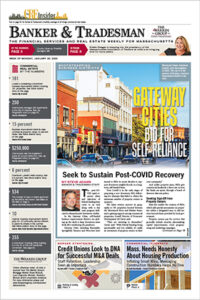
With the city’s commercial tax base continuing to erode, Boston leaders will face a bigger problem in only a few years. It’s not likely the business community will be interested in another deal that has them bearing even more of the burden. iStock illustration
Boston Mayor Michelle Wu has found a way to get her cake and eat it, too, when 2025 – an election year for her – rolls around.
After an at times heated and very public spat with the business community, the Boston City Council last week OK’d to her plan to shift more of the city’s tax burden on commercial properties starting in January.
Wu’s plan is now headed to the State House, where it is likely to get a green light now that it has the support of key business and real estate leaders.
Last week’s vote came on the heels of an agreement Wu struck with the heads of the Greater Boston Chamber of Commerce, developer trade group NAIOP Massachusetts and fiscal watchdogs the Boston Municipal Research Bureau and the Massachusetts Taxpayers Foundation.
As office building values have crumbled in Boston, they have destroyed what had been a cash cow for city tax coffers, with projections, by the Boston Policy Institute, of a $1.5 billion or greater revenue gap over the coming years.
Amazingly, Wu didn’t even have to agree to any reductions in city spending, either. Business leaders dropped their demand – already modest – that Wu lower the 8 percent increase in the city’s budget by a percentage point or two.
However, next time it may not be so easy. And given current market trends, not only will there almost certainly be a next time, and it won’t be long in coming, either.
Fiscal Crisis Likely to Worsen
Wu’s proposal is a temporary fiscal Band-Aid, shifting a greater proportion of the city’s tax burden onto commercial property tax owners for the next three years.
Barring a miracle and a massive return to the office by tens of millions of now-remote workers, the same dynamics that have triggered a tax and revenue crisis for Boston and other major cities will still be there.
As I reported recently, that $1.5 billion prediction by the Boston Policy Institute is based on the idea that commercial property values would drop by less than half of what city officials say they’re assuming the fall in values has been.
In fact, three years from now, the crisis – and the amount of lost tax revenue – is likely to be even bigger as some downtown office buildings just hanging on right now are foreclosed on or forced into sales by their lenders.
As Banker & Tradesman reported last week, a mere 500,000 square feet or so of downtown office space has been proposed for conversion to apartments. Brokerage Colliers estimates around 16.55 million square feet of vacant or available-for-lease space in the city. The culprit seems to be a troublesome cocktail of the tough real estate finance environment and a “no, you go first” attitude among owners of the biggest buildings.
Meanwhile, there are already some pretty big red flags when it comes to support for Wu’s tax deal in the business community.
Sure, the mayor managed to cajole the leaders of some of the city’s top business leaders into backing her tax shift plan.
But it was arguably under duress, with those same leaders – Jim Rooney of the chamber and Tamara Small of NAIOP Massachusetts, to name two – making clear that they still strongly disagreed with Wu’s refusal to make any attempt to rein in city spending.
And other business groups, not involved in the talks for one reason or another, are either staying noticeably silent on the deal or actively opposing it.
What Does GBREB Think?
Conspicuously absent from the discussions, however, has been the Greater Boston Real Estate Board – a major player, to say the least, in the local real estate community.
Greg Vasil, the board’s CEO, declined comment, saying the organization is waiting to see the final version of Boston Mayor Michelle’s tax proposal.
Back in June, the real estate board blasted the initial proposal by Wu, calling it “incredibly misguided” to raise tax rates on an “industry facing existential challenges” that has “long fueled Boston’s budget.”
In an email to its members, the Small Property Owners Association, which represents many small local landlords, argued there should be no deal without Boston agreeing to spending cuts.
“This is not a deal that is supported by SPOA and our members,” the real estate group noted in its email. “We wonder, therefore, if ‘business leaders’ consider their dues paying members as they broker this deal.”
The Boston Policy Institute has also been outspoken in its criticism of the deal cut by business leaders with Wu, saying the process has been too heavily dominated by insiders and mayoral aides, without enough outside expertise.
“The tax shift deal announced today comes up short of what Boston needs,” said Greg Maynard, BPI’s shift. “That is because … this year’s sharp decline in commercial real estate values will continue for years to come.

Scott Van Voorhis
House GOP Likely to Back Deal
Despite the opposition, the pact seems on track to win approval by the Legislature.
That said, the intensity of the opposition is just a preview of the pushback Wu is likely to receive if she comes back with a similar request in a couple years.
State Rep. Brad Jones, the Republican minority leader, said his members are likely to give a green light to Wu’s tax deal, feeling strongly about the issue of local control.
But they are likely to take a more skeptical approach if Wu comes back with the same or similar ask a few years from now.
“This is a well she has gone to now, but what is your plan for next year? That is something that has to be addressed,” Jones said. “This is a well I don’t see her having the ability to come back to.”
Scott Van Voorhis is Banker & Tradesman’s columnist and publisher of the Contrarian Boston newsletter; opinions expressed are his own. He may be reached at sbvanvoorhis@hotmail.com.





